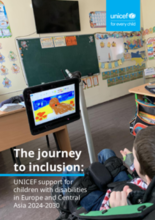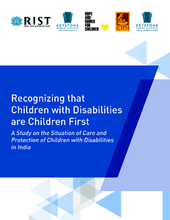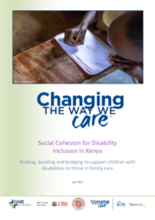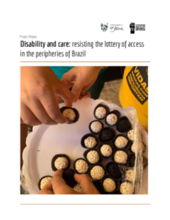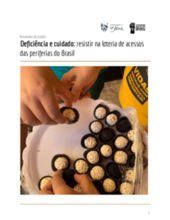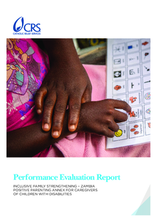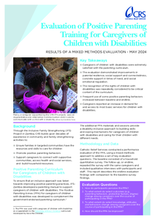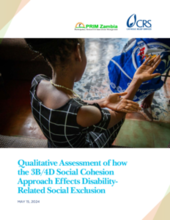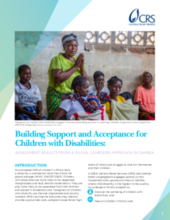Displaying 11 - 20 of 494
This summary draws on the work of the UNICEF Europe and Central Asia Regional Office (ECARO) with and for children with disabilities to develop pathways for their full inclusion in their communities.
On June 9, Keystone Human Services International and partners hosted a side event at the 18th Conference of States Parties to the CRPD on “Closing the Revolving Doors: A Lifespan Approach to Deinstitutionalization.” Panelists explored challenges, opportunities, and success stories in advancing sustainable care reform and community-based supports for children and adults with disabilities.
Based on the importance of including children with disabilities in the growing movement toward deinstitutionalization and care reform, the Children and Families Together – India consortium, with Keystone Human Services International as the prime, undertook an assessment of the situation of care and protection of children with disabilities in India.
This document presents a comprehensive report on a pilot project in Kenya that tested the Social Cohesion for Disability Inclusion Approach as part of the Changing the Way We Care℠ initiative. The report details the implementation process, participant feedback, and measurable shifts in knowledge, attitudes, and behaviors among caregivers and community members, highlighting increased empathy, inclusion, and advocacy.
This report examines the historical and social context of disability and care in Brazil, with emphasis on the perception of mothers and caregivers, highlighting the deep-rooted inequalities faced by people with disabilities and their mothers, particularly in peripheral areas. Brazil’s history of exclusion, rooted in racist, ableist, and sexist ideologies, continues to marginalize Black people, women, and people with disabilities, with Black and poor women disproportionately assigned care roles.
Este relatório examina o contexto histórico e social da deficiência e do cuidado no Brasil, com ênfase na percepção das mães e cuidadoras, destacando as desigualdades profundamente enraizadas enfrentadas por pessoas com deficiência e suas mães, particularmente em áreas periféricas. A história de exclusão do Brasil, enraizada em ideologias racistas, capacitistas e sexistas, continua a marginalizar pessoas negras, mulheres e pessoas com deficiências, com mulheres negras e pobres desproporcionalmente atribuídas a papéis de cuidado.
This report evaluates the Inclusive Family Strengthening (IFS) project's impact on caregivers of children with disabilities in Zambia. It highlights significant improvements in caregiver resilience, social support, and access to essential services. The report notes increased positive parenting behaviors, such as showing affection and rewarding good behavior, and a reduction in the use of corporal punishment.
This report provides an in-depth analysis of the Positive Parenting Annex (PPA) implemented by Catholic Relief Services in Zambia. This initiative aimed to support caregivers of children with disabilities by enhancing their parenting skills and resilience.
The Qualitative Assessment of How the 3B/4D Social Cohesion Approach Effects Disability-Related Social Exclusion in Zambia by Catholic Relief Services (CRS) highlights the Inclusive Family Strengthening (IFS) project's significant impact on reducing disability-related social exclusion. The project utilized introspection, intragroup and intergroup connections, and action to foster empathy, acceptance, and support for children with disabilities.
This report highlights the Inclusive Family Strengthening (IFS) project by Catholic Relief Services (CRS) and Catholic Sister congregations. This project aimed to improve the wellbeing of children with disabilities and keep them in family care.

